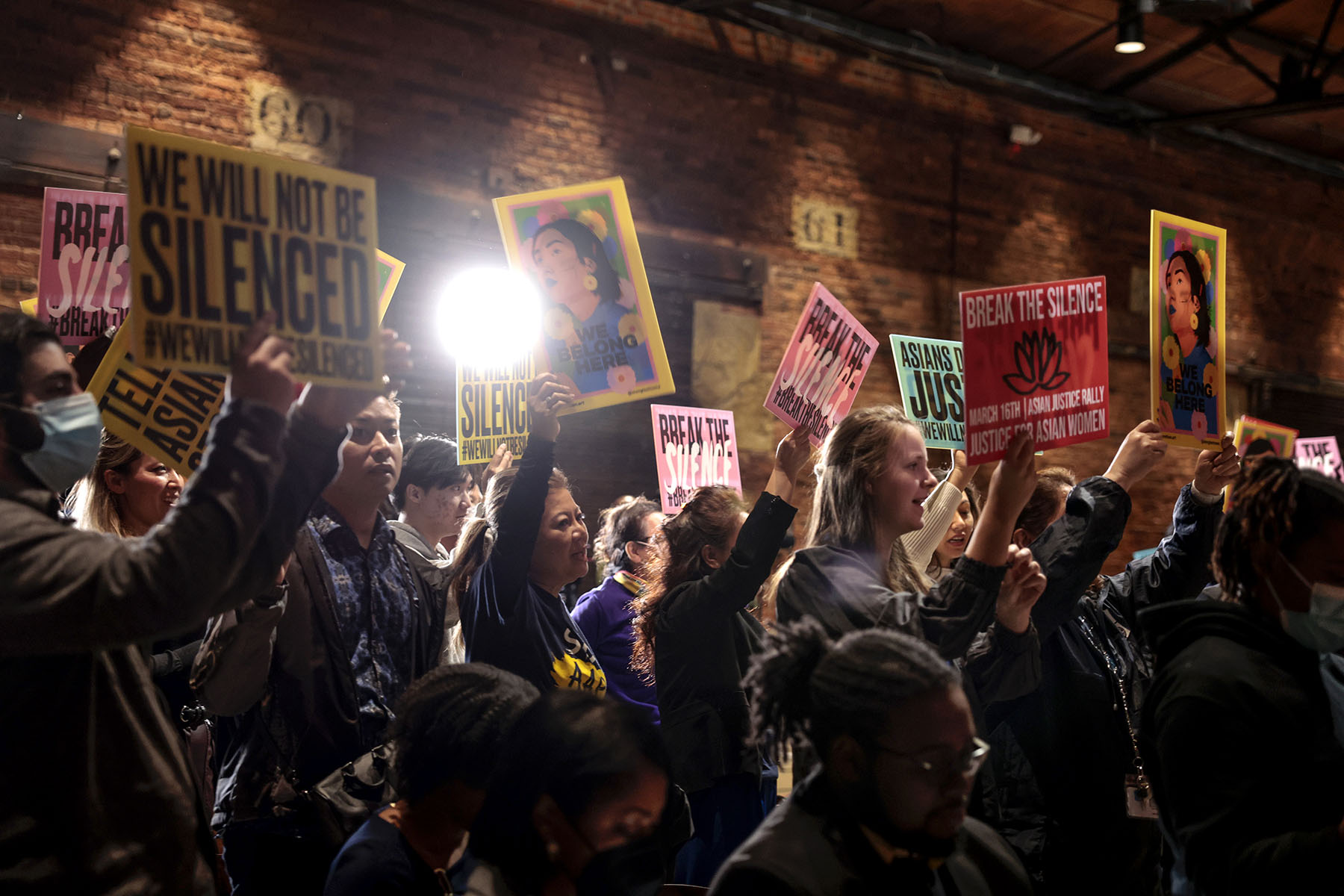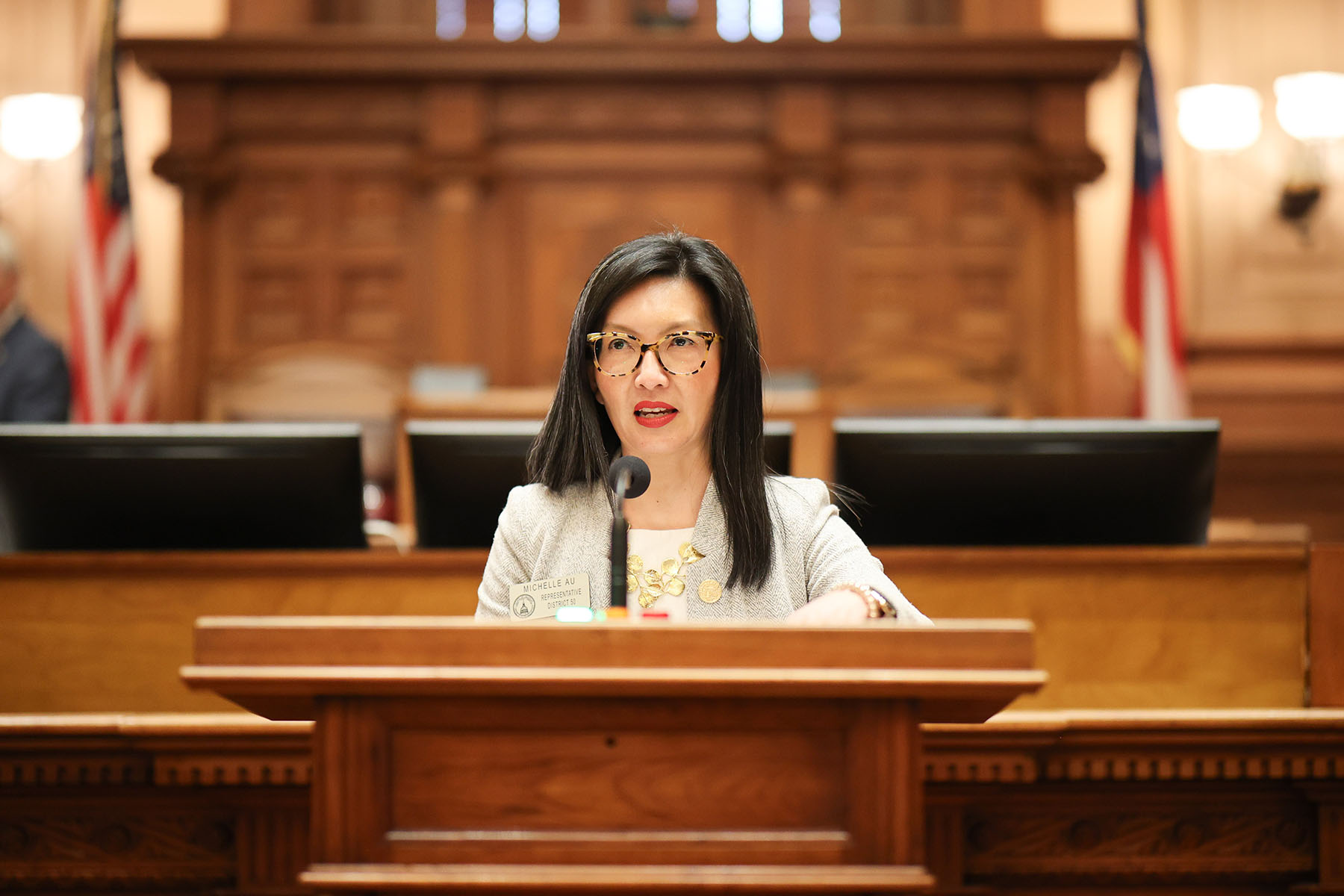This AAPI Heritage Month, we’re telling the untold stories of women, women of color and LGBTQ+ people. Subscribe to our daily newsletter.
When Dr. Michelle Au mounted her first run for office in Georgia, a political operative said she shouldn’t “waste too much of her time” reaching out to Asian American voters. “Asian people don’t vote,” she was told.
Au — elected as a state senator in 2020 and then, after new district lines were drawn, as state representative in 2022 — knows that this is not only inaccurate, but a dangerous miscalculation for anyone who wants to win races in Georgia.
For Au, a Democrat who represents key suburbs northeast of Atlanta, it’s no coincidence that so many of the votes up for grabs in 2024 are in her district — and from the many immigrant and first-generation Asian American voters who live there. She has worked to reach them, running as the proud child of parents and grandparents who immigrated from China in the 1960s. She’s also run as a public health advocate, as a mom whose children attended Fulton County public schools, a practicing physician who isn’t afraid to talk in plain language about the effect that gun violence is having on American families.
“When I talk to people who are not from the state, what is presumed about Georgia is that this is a purple state that is very Black and White. And I don’t mean that in a polarized way — I mean in terms of the types of voters that people talk about in Georgia: Black voters and White voters,” said Au, who also chairs the Georgia legislature’s first AAPI caucus. People are surprised by how many Asian-American voters are in Georgia and that it has the largest AAPI legislative caucus in the continental United States.
As of 2020, Georgia is a majority minority state, and Asian-American voters are its fastest-growing bloc. Many don’t have strong partisan loyalties, which makes them a demographic that both political parties are now spending real money to reach and to persuade. That’s why Au said that to talk about winning races in Georgia, you have to talk about — and to — Asian-American voters.
AAPI Heritage Month: Leaving our mark on American democracy
This story is part of our AAPI Heritage Month coverage. This month, we’re telling the stories of people who are carving out space as the nation gains new citizens and another generation of American-born AAPI people comes of age. Explore our work.
Karthick Ramakrishnan, the founder and executive director of AAPI Data and a professor of public policy at the University of California, Riverside, told The 19th that in both 2016 and 2020, Asian Americans and Pacific Islanders’ turnout grew more than that of any other group of eligible voters, both in Georgia and nationwide.
Between 2010 to 2020, the number of eligible AAPI voters in Georgia grew by 74 percent while the overall voter base grew by 15 percent. With President Joe Biden beating former President Donald Trump by just 11,779 votes in Georgia in 2020, the potential of Georgia’s Asian voters — many of whom are first-time voters and voters unaffiliated with a party — carries more power than ever.
“Normally, given the size of the Asian-American population in Georgia, we would not have expected a lot of investment in that community,” Ramakrishnan said. “But given how competitive elections are and the tilt of the Asian-American voter population toward Democrats as part of that story, [that] makes Asian American voters more important now than in the past.”
There are now more than 328,000 eligible AAPI voters in the state, making up just over 4 percent of the electorate. In Fulton County, where Au’s district is, AAPI voters constitute 10.5 percent of the eligible voter share.
Au said it’s no coincidence that after the 2020 election Republican operatives began to realize how critical it would be to reach these voters. Within weeks of her win, the Georgia Republican Party opened up an Asian voter outreach center in her district.

“At least they’re paying attention,” Au said. “Generally speaking for our society, it’s good that they care. But I still think that we are in sort of the infancy phase of people understanding the type of work that it takes to reach out to naturalized immigrant communities, people who don’t speak English as a first language, native language communities.”
Ramakrishnan said that because Georgia is a tossup in the 2024 presidential election, AAPI voters could play an even bigger role — especially in formerly Republican suburbans that have become more diverse and also more likely to determine the winner of an election.
The fact that they don’t have long-held party allegiances makes AAPI voters a target for both parties.
“When you have a pool of voters who are new to the process, or maybe are not completely married to one party or the other yet, they don’t have their partisan affiliations baked in. So you have this rare chance to persuade people on the strength of the policy, the strength of the argument, the strength of the candidate,” Au said. “You’re not going to switch anyone else’s minds anywhere else but in places like this.”
What Au said she hears the most about from her own constituents are concerns about public safety. “They worry about crime and they worry about the things they see in the news,” including gun violence. In an immigrant-heavy district like hers, “the American culture around gun ownership is really sort of off-putting to people, regardless of their political affiliation,” Au said.
Au has spoken out for firearm restrictions, including sponsoring a bill that would require that people securely store their guns to prevent children from gaining access to them. It was the first bill on gun restrictions heard in committee by the Republican-led Georgia General Assembly in 10 years. The hearing was held two years to the day after the March 16, 2021, shootings at a series of spas in Acworth, Georgia, that specifically targeted the Asian community. While Au’s bill didn’t pass, one that created a $300 tax credit for safe storage devices or gun safety lessons did.
Au described the 2021 shootings as something that “really did galvanize the community.” She doesn’t think it’s a coincidence that a record number of Asian Americans ran for office in Georgia in the election cycle after that — in fact, many down-ballot races had two Asian candidates running against each other. Today, there are 11 AAPI legislators in the Georgia legislature, an all-time record for the state.
Recent polling by AAPI Data found that for many Asian-American voters, racism and discrimination were big issues. “Voters who might have otherwise voted for a candidate based on evaluations of the incumbent or what they think about certain issues feel they cannot bring themselves to vote for a candidate who has espoused explicitly racist views,” Ramakrishnan said.
Au said she has faced discrimination in her time in the legislature. She was a part of a number of conversations on how to kill bills that would have barred transnationals from buying land. But it had to be done quietly. “When someone who looks like us speaks against a bill that targets immigrants, it invites a narrative that we are in the pocket of foreign governments, or that we are in fact advocating strongly for communist China, which is an accusation I constantly get. People question if I am loyal to the United States, if I am loyal to the state of Georgia,” she said.
What Au has encountered speaks to how perceptions about identity can shape politics — and who is sometimes excluded. She said it’s important to work to include those voters.
According to research conducted by Asian and Pacific Islander American Vote in 2022, 82 percent of Asian-American adults in Georgia speak a language other than English at home, and 37 are “limited English proficient” (or, say that they speak English less than “very well”). The top five Asian languages spoken in Georgia are Chinese, Vietnamese, Korean, Hindi and Gujarati. In the national 2022 Asian American Voter Survey, among Asian Americans who spoke a language other than English at home, 11 percent said that language has been a barrier in voting.
“It takes more work. It takes someone who can speak an Asian language and also speaks English as a second language. It’s more expensive to translate campaign materials into different languages,” Au said. It’s also harder to poll voters who don’t speak English, which means they’re often left out.
The work of reaching potential new voters in their first language is most importantly the opportunity to connect with voters who may not have strong, established voting habits rooted in partisan loyalties, Au said. She said that while canvassing in her own district, she routinely encounters multi-generational family units with citizens and non-citizens alike — households all interested in getting to know candidates through the merits of their positions.
For Au, having AAPI candidates is critical.
“A lot of the work that we’ve been doing is showing people that first of all, we exist — not just as voters, but as legislators,” Au said. “And then it’s about convincing people that Asian voters are worth reaching out to because their numbers are significant enough that it deserves the investment that they give to other voting groups.”






